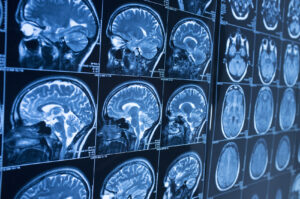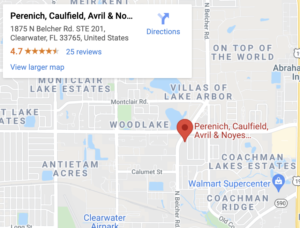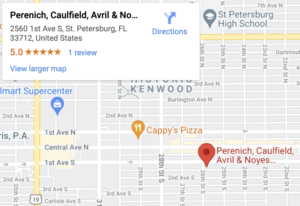
A concussion injury is generally defined as a mild traumatic brain injury (mild TBI).
However, the damage caused by a brain injury can affect how a person learns, acts, thinks, and sleeps. Therefore, a concussion injury could result in brain damage that has long-term effects that are anything but mild.
Table of Contents
What Are Some Common Causes of Concussion Injuries in Clearwater, FL?

A concussion causes a loss of normal brain function temporarily. The concussion can cause a temporary change in the person’s mental status and/or level of consciousness.
Blunt force trauma is a common cause of concussion injury. The blunt force trauma can come from a bump, blow, or jolt to the head. The trauma does not need to penetrate the skull to cause brain damage.
Furthermore, the trauma that causes a concussion does not need to be a direct impact on the head. Instead, a whipping action of the neck or a strong jolt to the torso can cause the brain to move violently within the skull. As the brain shifts, it collides with the skull, causing damage at the impact location.
Concussions can result from accidents and situations including but not limited to:
- Playing sports
- Falls
- Nursing home abuse
- Motorcycle accidents
- Assaults
- Car accidents
- Workplace accidents
- Truck accidents
- Running into an obstacle
- Recreational activities
- Pedestrian and bicycle accidents
- Being struck by an object
- Assault
- Swimming pool accidents
- School and playground accidents
Some individuals have a higher risk of sustaining a concussion. For instance, a prior concussion increases your risk of another concussion if you sustain a head injury.
What Are the Signs and Symptoms of a Concussion Injury?
Concussion symptoms vary widely. For example, you should never assume you did not sustain a concussion injury merely because you did not lose consciousness. While loss of consciousness is a sign of a concussion, every concussion victim does not lose consciousness.
In addition to the loss of consciousness, other symptoms that could indicate you sustained a concussion injury include:
- Headache
- Confusion, difficulty concentrating, and/or memory loss
- Dizziness, loss of coordination, and/or trouble balancing
- Nausea and/or vomiting
- Sensitivity to light, blurry vision, or double-vision
- Ringing ears
- Troubling fall asleep
- Loss of smell or taste
It is wise to seek medical attention after any head injury. A trained medical professional can determine if you sustained a concussion and the severity of the brain injury. Additionally, prompt medical care provides evidence that can be used to link the accident to the cause of your concussion for a personal injury claim.
Warning signs that you might have sustained a more severe brain injury and need immediate medical treatment include:
- Seizures
- Inability to recognize places or people
- Slurred speech
- Loss of consciousness
- Inability to wake up
- One pupil is larger than the other
- Headaches that have not gone away or worsen
- Agitation and/or unusual behavior
- Symptoms have worsened and/or not gone away within 10 to 14 days
Children may display the same or similar signs of a concussion as adults. However, children may present different warning signs that they sustained a brain injury.
Signs to watch for if your child sustains a head injury include loss of new skills, poor attention, and regression in developmental progress. A child with a concussion injury might experience mood changes, be inconsolable, or have high-pitched/constant crying. The child might also refuse to eat or nurse and experience problems with sleep.
How Do Diagnosis and Treatment Work for Concussion Injuries?
Doctors review a person’s symptoms and perform a Glasglow Coma Scale (GCS) to test a person’s motor, verbal, and eye responsiveness. CT scans and MRIs are not routinely used to diagnose concussions. However, a doctor may order these tests if they suspect bleeding or severe brain injury.
Generally, concussion patients are advised to rest. Doctors may prescribe medications to treat the symptoms of a concussion injury.
Concussions typically heal within a few days or weeks. However, a person may develop concussion complications. If a person experiences persisting concussion symptoms for two or more months, it could indicate post-concussion syndrome.
What Compensation Is Available for Concussion Injuries in Florida?
When another party causes your concussion, you can seek compensation for damages. The settlement can include compensation for economic and non-economic damages.
Examples of non-economic and economic damages for a concussion injury include:
- The cost of medical treatment and care
- Occupational, physical, and other rehabilitative therapies
- Decreased quality of life
- Emotional distress and mental anguish
- Impairments, disfigurements, and disabilities
- Loss of enjoyment of life
- Out-of-pocket expenses
- Lost wages and diminished earning capacity
- Physical pain and suffering
- Long-term skilled, personal, or nursing care
In some cases, a jury could award punitive damages. However, you must prove that the other party is guilty of intentional misconduct or gross negligence. Punitive damages are only awarded in a small number of personal injury cases.
The defense can raise allegations of contributory fault. Under Florida’s new modified contributory fault law, victims are barred from receiving compensation if they are more than 50% at fault for causing their injuries. If you are 50% or less responsible, you can still recover compensation, but the court can decrease the amount by the percentage of fault assigned to you.
What Is the Florida Statute of Limitations for Concussion Injury Claims?
The Florida statute of limitations is the deadline for filing a lawsuit. The deadlines vary depending on the type of personal injury case filed and other factors. If you miss the deadline, you could lose your right to pursue a case in court.
The deadline for filing most personal injury lawsuits is two years from the accident or injury date.
However, cases that involve intentional torts or strict liability usually have a four-year statute of limitations. Also, general negligence claims before March 24, 2023, may still have a four-year deadline.
Florida’s statute of limitations can be confusing. The facts of the case and the parties involved could change the deadline. It is always best to seek legal advice as soon as possible after a concussion injury to protect your rights.
Schedule a Free Consultation With a Clearwater Concussion Injury Lawyer
Brain injuries can have long-term consequences that cause mild to severe impairments. If you sustained a concussion injury because of another party’s negligence or intentional torts, you could be entitled to compensation for your injuries. Contact our experienced injury lawyers for a free case evaluation.


